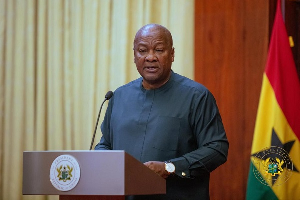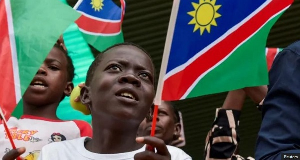Without doubt, our interactions with each other, spiritual nourishment irrespective of denomination, helps to navigate the complex journey of life.
It is often a sheer pleasure to attend and observe religious gatherings in Africa: the choir bellowing out wonderful songs of praise, the priest relaying messages of hope, church attendees dancing with some of them going into trance; at funerals, the talking drums hollering cultural songs and attendees twirling and waving their handkerchiefs.
Over the past few months these events have however been interrupted by the cunning and elusive novel SAR-COV-2 (aka Coronavirus).
According to WHO, droplet transmission of the Coronavirus may occur through fomites in the immediate environment around an infected person. Thus, transmission of the microorganism can occur by direct contact with infected people and indirect contact with surfaces in the immediate environment or with objects used on the infected person
Between mid-February and March 25th 2020, a gathering at South Korea’s Shincheonji church accounted for over 50% of approximately ten thousand SAR-COV-2 infections present in the country at that time.
This spectacular spread over a month supposedly started with an infectant officially identified on February 18th. On May 9th, President Nana Akufo Addo announced that one person had infected 533 people at a fish factory in Tema.
In the United States, Houston’s Holy Ghost Parish suspended masses on the 19th of May after the death of a priest and the infection of five church members. On May 20th, the CDC reported that over 30% of ninety two people that attended church events in Arkansas during early March were infected with the Coronavirus. Three parishioners died and an additional 26 cases linked to the church spread into the community.
These are some reported examples to prove that it ONLY takes one infected individual to start a major outbreak. Hence the need for some restrictions and adjustments on large public, social, workplace and educational gatherings during these trying times.
Various independent authoritative studies have supported the need for amongst others, hygiene enhancements, social distancing and the wearing of face protection masks to minimise the spread of SAR-COV-2.
It is looking increasingly likely that the way we group together to revel in our beliefs, mourn and honour the departed at funerals, entertain, educate, and discharge functional duties within the workplace will have to drastically change. At least until there is herd immunity or a vaccine for SAR-COV-2 has been developed.
Before the arrival of SAR-COV-2 such gatherings, where people came into close contact with each other and each other’s respiratory droplets, were relatively harmless. Sadly, not anymore.
Today, some of these respiratory droplets innocently released and circulating in the often poorly ventilated environments could contain the cunning and elusive novel Coronavirus, which according to the WHO rapidly passes via droplets during close unprotected association between an infector and infectee. There is peer reviewed scientific research that shows that it takes just one SAR-COV-2 carrier and possibly an asymptomatic individual to easily and innocently “super spread” the virus like a bush fire within a congregate and into a community.
It is an accepted fact that SAR-COV-2 does not differentiate between the young and old. In an educational setting, it will just take one asymptomatic child/student to innocently infect his/her class mates. Each one of these pals will in turn “unintentionally transport ” the coronavirus home and pass it on to their parents, family members, other friends, grandparents and into the community.
For now, experts like University of Massachusetts’ Professor Erin Bromage, George Washington University’ Professor Jonathan Renier and NHS England’ Professor Powys rightly predict that unless humanity (1) adapts to the new forms of interactions plus (2) strictly adhere to the proven WHO guidelines, the coronavirus will continue with its rampant spread within the global community.
Yes, of course, the ban and controls on public gatherings at churches, funerals, required adjustments to configurations within the workplace and educational settings and so forth cannot continue indefinitely.
However, with so much still unknown about SAR-COV-2, the big dilemma facing all governments is when to lift these restrictions knowing the potential unintended consequences of indiscipline and passive resistance especially on: (1) the aged and vulnerable in society, and (2) the relatively weak public healthcare systems.
Current data clearly indicates that the majority of “infectants” will fully recover. Some of these infected individuals may even never know that they were infected plus display any symptoms.
As at May 28th unfortunate fatalities globally and in Africa as a percentage of recorded infections remain just below just 7% and 3% respectively. In Ghana it below 0.50%. Despite these very encouraging trends, the latest facts from WHO has further confirmed the adverse implications of SAR-COV-2 infections on the elderly and vulnerable (especially those with comorbid conditions) in society.
Within this population subgroup, the impact of the associated COVID-19 disease has proved to be relatively more severe resulting in higher fatality rates. Data from John Hopkins University, Harvard, and many more experts illustrate the almost defencelessness of the elderly and people with comorbidities to the Coronavirus. WHO data indicates that as of April 2020 more than 95% of COVID-19 global deaths were among people over 60 years of age.
In Sweden, over 90% of all deaths, according to WHO, were people over 70 years of age. In Ghana, the majority of the over thirty unfortunate fatalities were over 50 years of age. Based on these statistics, experts including Epidemiologist Professor Salim Abdool Karim, Dr Hans Kluge, WHO regional director Europe, US Presidential advisor on COVID-19 and director of NIAID, Dr Anthony Fauci, Dr Sarkodie from the Ghana health Service UK’ Secretary of state for health and social welfare Matt Hancock and others have opined that the older generation are the most vulnerable to the worst effects of the COVID-19 disease and should therefore be particularly protected from the virus.
It is also important to remain cognisant of the fact that our relatively fragile public healthcare system is currently not in a position to cope with any sudden major upsurge in COVID-19 cases.
It is for these reasons why, even once current social gathering restrictions have been relaxed, until such time that decision makers for social and religious gatherings, educational and organisational leaders (1) accept full responsibility to improve ventilation in their respective environs, (2) undertake to regularly clean and disinfect their grounds, (3) accept and enforce the significant reduction of group sizes at their congregations, (4) enforce the strict wearing of face protection masks even while talking, singing, chanting, wailing, working, educating etc., (5) maintain social distancing of at least 1.5 meters in massed areas, and (6) provide hand sanitizers, it may be worth the aged and vulnerable in our society seriously considering limiting their presence at such public gatherings.
Our ability to outsmart and coexist this highly infectious virus largely depends on our individual actions, citizenry responsibility and vigilance . As governments look for ways to: (1) balance lives versus livelihoods; (2) strengthen public health infrastructure and interventions to cope with living with the virus; and (3) anticipate a possible “round two” of this complicated battle, the onus is on each one of us to ensure that we protect one another by respecting the clearly laid down WHO guidelines and adapting to the rapidly evolving new reality.
On May 25th , Dr Ryan executive director of WHO rightly pointed out that although infection cases are declining there could be a second peak during this phase if countries let up restrictions too soon.
Therefore, if we ignore the need to respect containment guidelines, various red alerts for patience, mindset and behavioural change from leaders including President Nana Akufo Addo, Germany’ Chancellor Angela Merkel, New Zealand’ Prime Minister Jacinda Ardern, UN Secretary General António Guterres, Singapore’ Prime Minister Lee Hsien Loong, South Africa’ President Ramaphosa, South Korea’ Prime minister Chung Sye-kyun, WHO Director General Tedros Adhanom Ghebreyesus, some local and international experts and policy makers including, Epidemiologist Professor Quarraisha Abdool Karim, Information minister Hon Kojo Oppong Nkrumah, South Africa’ Health minister Dr Zweli Mkhize, US Presidential advisor on COVID-19 Dr Deborah Birx, Presidential health advisor Dr Nsiah Asare, UK Medical Director and Director of Health Protection for Public Health; Professor Doyle, Ghana’ Health minister Hon Agyeman Manu, Director general-Ghana Health Service Dr Kuma-Aboagye, the local and global medical fraternity, some interfaith leaders and the scientific fraternity, it will be at our own peril.
Professor Douglas Boateng is an international chartered director and Africa’s first ever appointed Professor Extraordinaire for Industrialisation and Supply Chain Governance. www.panavest.com
Opinions of Friday, 29 May 2020
Columnist: Prof. Douglas Boateng



















